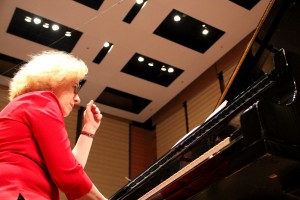To hear excerpts of Sara’s interview and her performance please click on the panels above.
Published in Oakland North with accompanying audio: http://oaklandnorth.net/2011/11/07/oakland-east-bay-symphony-features-renowned-pianist-sara-davis-buechner/
By Casey Capachi
Sara Davis Buechner arrived at the rehearsal late. She had just flown in from the East Coast and was running on little sleep as she prepared to rehearse with the Oakland East Bay Symphony for their opening concert for the 2011-2012 season. “I usually wear sweatpants, but decided to wear something nice tonight,” said Buechner, removing her jacket and tousling her shoulder-length blonde hair to reveal a fitted red blouse as she walked towards the piano on stage at the San Francisco Conservatory of Music.
Buechner began by playing “The Age of Anxiety,” a highly energetic piece from Leonard Bernstein’s Symphony No. 2, just one of a number of pieces the symphony had chosen for their New World A-Comin’ concert, which took place on November 4. The show featured an array of music by American composers like Duke Ellington and George Gershwin, as well as by the Argentinian Alberto Ginastera.

Buechner’s light eyes flitted across the pages of music as her fingers glided across the keyboard, sometimes as delicately as though she was flicking dust off of the edge of a table and other times furiously pressing down as if the keys were a game show buzzer for a question she desperately wanted to answer.
Buechner, an associate professor of piano at the University of British Columbia in Vancouver, established her success early in her career, in 1984 winning the gold medal in the Gina Bachauer International Piano Competition and in 1986 the bronze medal in the Tchaikovsky International Piano Competition. She has toured as a soloist, joining forces with many of America’s most prominent orchestras including the New York Philharmonic and the San Francisco Symphony. She has also produced dozens of recordings as well as played scores for silent movies and dance company performances. She is currently working on a multi-CD collection of J.S. Bach’s keyboard works. Buechner has previously played Beethoven’s C Major Concerto with the Oakland East Bay Symphony in 2009.
With an active repertoire of over 100 piano concertos, Buechner’s agile hands have tickled the ivories all over the world. They are also the same graceful hands that once belonged to David Buechner, who in 1998, at the age of 39, transitioned to being Sara.
“I think it’s fair to say that I’ve encountered a lot of walls and a lot of problems because of being transgendered,” said Buechner as she took a break from rehearsing. Buechner has said that despite her credentials—an undergraduate degree from Juilliard and doctorate degree from the Manhattan School of Music—she experienced difficulty booking concerts and finding teaching opportunities following her gender reassignment. She even moved to the Bronx from Manhattan, where she said she found greater acceptance. She began touring regularly again after hiring a new agent, Carrie Feiner, a classmate of hers at Juilliard, who was determined to have her showcase her talent again. Slowly Buechner started playing to crowds as Sara and having the success she had experienced as David.
Instead of dwelling on the obstacles that she’s had to overcome as a transgendered woman, Buechner remains hopeful for young musicians, whom she sees as growing up in a more progressive era. “I’m very encouraged by the young musicians I get to work with, people much younger than me who really look up to me,” said Buechner. Buechner says she is beginning to forget all the issues “the older generation had” and is inspired by the acceptance she has since experienced living with her wife, whom she met before her transition, in Vancouver. Canada is one of a handful of countries in which same-sex marriage is legal.
Buechner pauses, smiles, unsure whether or not to say something “crude” before continuing. “I have often said to people, ‘I don’t know why we’re so obsessed with what’s between the legs—I think what’s between the ears is a lot more important,’” she said.
With that, Sara rises and goes back into the concert hall, where the rest of the orchestra awaits her return. She sits down, waiting for her cue following a swelling of violins, then hits a wrong note forcefully. “Jeez!” she exclaims. She tries the same scale again, this time hitting each note perfectly.
